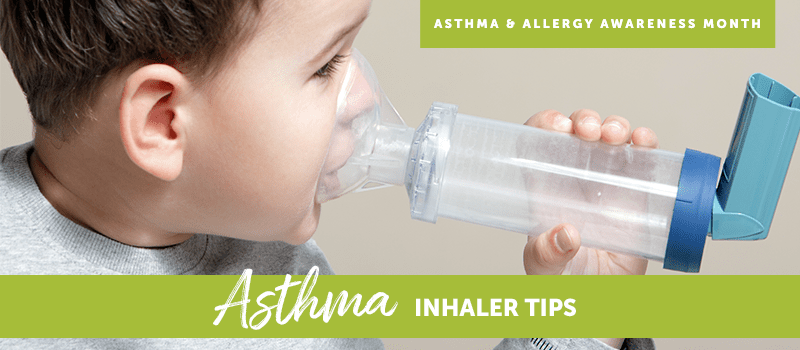May is national asthma and allergy awareness month. As part of our effort, The Youth Clinic pediatricians want to remind parents about the importance of correct usage of inhalers. A rescue inhaler can be a game-changer for many children who suffer from asthma, and inhalers are a staple of millions of patients’ treatment. Take a look at these inhaler usage techniques to ensure your child receives her medicine as effectively as possible.
Prime the Inhaler: Prime the inhaler with three or four sprays to prime the inhaler before its first use. If it’s sat unused for more than a couple weeks, prime it again before using. This ensures your child receives a full and accurate dose of medication.
Shake It Up: The medication in an inhaler is in a solution, and settles. Shake the inhaler 15 times before each use to guarantee medicine is mixed well.
Use a Spacer: Spacers help medication enter into the airways rather than getting stuck in the mouth. Spray a single dose of medicine into the spacer, and inhale slowly.
Watch: How to Use a Metered Dose Inhaler with a Spacer and a Mask
Inhale through Mouth: Smaller children may not understand they need to inhale through their mouth when using an inhaler. If inhaling through the nose, medication may not reach the airways.
Stand Up: Lungs can inhale more easily when your child stands than when he sits. Use an inhaler standing up, to allow a full inhalation, which lets medicine reach – and treat – the lungs more effectively.
Mind Expiration Dates: Mind the expiration dates on your child’s inhalers. Albuterol inhalers typically expire a year after the prescription was filled. If your child’s is expired, speak with a pediatrician to refill the prescription.
Unless your pediatrician specifically instructs you to use over-the-counter asthma medications such as inhalers, it’s best not to use them. Any child with asthma should be under care of a pediatrician, and parents shouldn’t supplement that with over-the-counter care.
At The Youth Clinic, we acknowledge that each child’s asthma experience is unique. Our pediatricians and pediatric physician assistants work closely with patients and their families to create tailored treatment plans that allow asthma symptoms to be effectively controlled.
Helpful Asthma Resources

Rid of Asthma Triggers
Asthma may be triggered by allergens & irritants that are common in the home. Learn more.
Asthma Facts
Asthma is a chronic lung disease that inflames and narrows the airways. Learn more.
After-Hours Urgent Care
Have an urgent asthma issue? Visit our pediatric urgent care facility for after-hours care.

